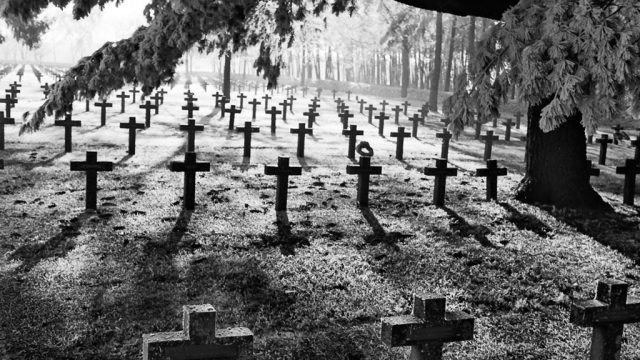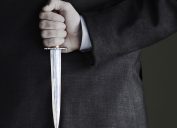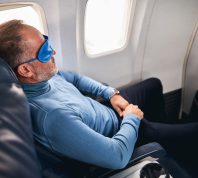Fiction: "Tranquility"
Some men find peace by searching for meaning. Others find it by abandoning the quest.

Grisham. Mamet. Kerouac. McInerney. Palahniuk. One of the most gratifying things about bringing back Best Life—the first-ever luxury service magazine for men—digitally is the chance to share a treasure trove of fiction from the world's most talented storytellers. (And we'll do so every Friday this Fall.) Our first exclusive, "Tranquility," is a short story by John Grisham, America's #1 bestselling author and master of the legal thriller. Enjoy.

ON THE LAST EVENING OF HIS LIFE, JOEY Logan endured the silly rituals that were so important to the prison officials. He was moved to the observation room, next to the death chamber, a cell slightly larger than the one he'd occupied for the past seventeen years, and there he was watched closely so he could not take his own life before the State had the opportunity. He met with his lawyer for the last time and was told, in somber, heavy words, that the final appeals had run their course and there was no hope. He chatted with a priest because spiritual advice was strongly recommended at that hour. He was examined by a doctor who checked his pulse and pressure, and noted that he was, in fact, healthy enough to be properly killed. He met with the prison warden and made choices that few men get to make: What to eat for his last meal? (steak and fried potatoes). What to do with his body? (Joey didn't care–give it to science). What to wear to his execution? (the choices were limited). What to say when he was strapped with Velcro to the gurney and given the chance to utter his last words on this earth? (undecided, but he would think of something). Who would witness the execution from his side of the death chamber? (no one, not even his lawyer). What about his possessions? (burn them).
And so on.
An hour was set aside for the last visit with the family, but that hour came and went with no visitors. In his seventeen years on death row, Joey Logan had never received a card, letter, or package from a member of his family. There was no one out there. He owned three boxes full of papers and clippings and filings and other junk sent by lawyers and advocates and journalists and the usual assortment of nuts and kooks who, for lack of anything useful to do, embraced the hopeless causes of men sentenced to die. All three boxes would be burned within the next twenty-four hours.
At midnight, eight hours before the fatal moment, Joey sat quietly on the concrete bunk and played solitaire on a folding table. He was calm and very much at peace with his world. He had refused a sleeping pill. He had nothing else to say, to write, to do. He was finished.
A large black man with a shaved head and tight uniform walked to the rows of bars and said, "You okay, Joey?"
Joey looked up, smiled, and said, "Sure, Pete. Just waiting."
"Anything I can do for you?" Pete asked.
It was obvious there was virtually nothing Pete could do for his prisoner at that moment, but he was a thoughtful man. With two exceptions, the guards on death row were not abusive. Though they watched over condemned killers, their inmates were locked down for twenty-three hours a day, many of them in solitary confinement. And after a few months the prisoners became subdued, docile, institutionalized. Violence was rare on death row.
Joey stood and stretched and walked to the bars. "There is one thing, Pete," he said, reluctantly, as if he really didn't want to ask for a favor. But why not?
Pete shrugged and said, "I'll try."
"I haven't seen the moon in seventeen years. Could I possibly go out to the yard for a few minutes?"
Pete glanced down the hall, pondered this, said, "Now?"
"Sure. The clock's ticking. According to my almanac, it's a full moon tonight."
"It's full all right. Saw it just an hour ago.
"Let me check," Pete said, and disappeared. Pete was the supervisor for the night shift, and if Pete decided it was okay, then it was okay. It would be a minor violation of the rules, but the rules were often bent slightly in a man's final hours. Besides, Joey Logan never caused trouble.
Minutes later, a switch was pulled, metal clicked, and Pete was back with a pair of handcuffs, which he fit loosely around Joey's wrists. The two walked silently down the narrow, unlit hall, past the dark cells of sleeping prisoners, through a door and then through another until they stepped into the cool, crisp air of the autumn night. Pete removed the handcuffs.
The yard was a patch of brown grass sixty feet by fifty–every inmate knew its precise dimensions–secured by thick chain-link fencing topped with curls of razor wire. Beyond that was another row of fencing and then a wall of brick eighteen feet tall. For one hour each day, Joey and two other inmates paced the yard, counted their steps, swapped their stories, told their jokes, played their games, and soaked up the few precious moments of human contact.
Pete held back, stood by the door, and watched his prisoner.
The yard's only fixture was a metal picnic table where the prisoners often played cards and dominoes. Joey sat on the table, slick with dew, and looked at the moon. It was high in the sky, full and tinted slightly with orange, perfectly round.
Death row held many mysteries. The cavemen who'd designed it had tried to construct a maximum-security unit with as many harsh features as possible. This was what society demanded. The politicians who funded prisons got themselves elected and reelected by promising more prisons, and harsher ones at that, and longer sentences for the criminals, and, of course, more use of the death chamber. So Joey and the others slept on bunks made of concrete and covered with thin foam pads less than an inch thick. They tried to keep warm with threadbare blankets. They lived in cells ten feet by twelve, too small for one man and impossible for two. But two was preferable because solitary confinement was the worst torture of all. Death row was a low flat building with few windows because, of course, windows might lead to thoughts of escape. The cells were crammed together internally, as far away from the exterior walls as any blind architect could draw them. Long ago Joey had adjusted to the wretched food, the stifling humidity in the summer, the bone-chilling cold of the winter, the ridiculous rules, the constant yelling and the insufferable racket; long ago Joey had found peace among the insanity. But he could never adjust to the fact that he could not see the moon and stars at night.
Why not? There was no reasonable answer. There was no one willing to entertain the question. It was simply one of the mysteries.
Less than eight hours to live. Joey Logan watched the moon, and smiled.
For most of his childhood, for most of his life before prison, he had lived outdoors, in stolen tents and abandoned cars, under bridges and railroad overpasses, always on the edge of town, hiding, always hiding. He and Lucas roamed at night, looking for food, breaking and entering, stealing whatever they could find. The moon was often their best friend and often their worst enemy. The moon dictated their plans, their strategies, their movements. A full moon on a cloudless night meant one plan of thievery and escape. A crescent moon, another. A sliver of a moon or no moon at all changed the plans and required them to find another building to break into. They lived in the shadows caused by the moon, often hiding from the police and other authorities.
Many nights, after they'd cooked their stolen food over a campfire, they would lie on the ground, deep in the woods, and stare at the sky. They studied the stars, learned the names of the constellations from a stolen book on astronomy, and watched them as they changed through the seasons. One burglary of a home netted them a set of powerful binoculars, which they decided to keep and not fence. On clear nights, they would lie in the darkness for hours and watch the moon, study its craters and valleys, highlands and lowlands and mountain ranges. Lucas would always find the Sea of Tranquility, which was not that difficult. Then he swore he saw a lunar module left behind by an Apollo spacecraft.
But Joey never saw it, and he suspected Lucas was lying, as was his habit. Lucas was the older brother and thus the leader of their little unwanted family. Lying and stealing came as naturally as breathing and hearing for Lucas, and for Joey as well. Throw two boys onto the streets without a dime and without a crumb of food, and they'll quickly turn to petty crime to survive. They'll learn to lie and steal. Who could blame them?
Their mother was a prostitute who abandoned them early on. She later died, drugs. Joey's hair was blond, Lucas's black, different fathers–two men who left nothing behind but their seeds and a little cash for the transactions. The boys were separated, and then sent to various foster homes, orphanages, and juvenile centers. They were reunited when Lucas escaped, found his little brother in a foster home, and took him away to the woods, where they lived by their own rules and somehow persevered.
A cool breeze picked up gently from the west, but Joey ignored the chill. In a guard tower a quarter of a mile away, a light came on. Two flashes, then three. Some sort of signaling routine to amuse the guards. The prison was officially locked down in preparation for his execution, which meant another set of stupid rules designed to do nothing but make the event far more dramatic than necessary. Joey had endured eight executions from the inside of death row, and the heightened security and extra layers of tension were added by small men who needed to feel important about their work.
How could a man who'd been buried on death row for many years suddenly decide to escape to avoid being executed? It was a ridiculous notion. No one ever escaped from death row, not on foot anyway. But Joey was about to escape. He would leave in a dream, float away in a cloud of sodium thiopental and vecuronium bromide, simply close his eyes and never wake up.
And no one would care. Maybe somewhere far away a family would rejoice in the news that the killer was gone, but Joey was no killer. And maybe the police and the prosecutors and the tough-on-crime crowd would all shake hands and proclaim that their wonderful system had once again worked, maybe not perfectly, maybe with too many delays, but justice had prevailed. Another killer was gone. The State could beef up its execution statistics, feel proud of itself.
Joey was so sick of it all. He did not believe in heaven or hell, but he did believe in an afterlife, a place where the spirit and body are rejoined, a place where loved ones see each other again. He had no desire to see his mother and no desire to meet his father, and he was certain those two people would not be allowed into his little corner of the afterlife. But Joey was desperate to see Lucas, the only person who'd ever cared for him.
"Lucas, Lucas," he mumbled to himself as he shifted his weight on the metal table. How long had he been sitting there? He had no idea. Time was a difficult concept in those last hours.
Seventeen years later, and Joey still blamed himself for Lucas's death. Joey had picked the target, a modest brick home on a small farm a few miles from the city. Joey had scouted the house and decided it would be an easy hit. They would do their usual grab-and-run, jam a door, take the food from the fridge, maybe a radio, a small television, a rifle or two, anything they could sell or fence. No more than three minutes inside, which was about their average. The mistake had been in their timing. Joey was convinced the family was out of town. The car was gone. The newspapers were piling up at the end of the driveway. The dog was nowhere to be seen. They would pull the job at three in the morning, under a quarter moon, and be back in the woods grilling steaks before sunrise.
But the farmer was home, and he slept with a shotgun near his bed. Joey was on the back patio with a case of beer when he heard the shots. Lucas, who went nowhere without his favorite stolen pistol, managed to fire twice before being ripped apart by two shotgun blasts. There were screams, then lights and voices. Joey instinctively ran back into the house. Lucas was dying quickly on the kitchen floor. The farmer was down in the den, not dead but fatally wounded. His son appeared from nowhere and beat Joey senseless with a baseball bat.
Two dead bodies were not enough. Justice demanded more. Joey, the accomplice, age 16, was charged with capital murder, put on trial, found guilty, and sentenced to death, and here he was now, seventeen years later, watching the moon and wishing the hours would quickly pass.
Pete approached silently with black coffee in two paper cups. He handed one to Joey, then situated himself on the table beside his prisoner.
"Thanks, Pete," Joey said as he wrapped both hands around the cup.
"No problem."
"How long have I been out here?"
"I don't know. Maybe twenty minutes. You cold?"
"No. I'm fine. Thanks."
They sat for a long time with nothing said. They sipped the strong and rich coffee, coffee obviously made for the guards and not the prisoners.
Pete finally said, "It's a beautiful moon."
"It is. Thank you for lettin' me come out here, Pete. This is very nice of you."
"Nothing to it, Joey. You remember Odell Sullivan, went down ten, maybe twelve years ago?"
"Remember him well."
"He wanted to see the moon too. We sat right here for an hour on his last night, but there were some clouds. Nothing like this.
"Odell was a mess," Pete continued. "He killed his wife, and his kids never spoke to him. Plus, he had this crazy radical lawyer who'd convinced him that some court somewhere was planning to issue a last-minute stay and save his life. One minute he was defiant, then he was crying, then he claimed to be innocent. He was pitiful."
"How long have you worked here?"
"Twenty-one years."
"How many executions?"
"You're number eleven."
"Out of the other ten, how many were not afraid to die?"
Pete thought for a moment, then said, "Two, maybe three. You hear it all the time–'I'd rather die now than spend the rest of my life on death row'–but when the end is near most lose their courage."
There was another long pause as they sipped coffee and looked upward.
Joey pointed and said, "You see that large dark spot, just right of dead center?"
"Sure," Pete said, though he wasn't sure.
"That's the Sea of Tranquility, where the first man walked on the moon. It was caused by a collision with either a comet or an asteroid some three billion years ago. The moon takes a beating. It might look peaceful, but there's a lot going on up there."
"You seem right peaceful, Joey."
"Oh, I am. I'm looking forward to my execution, Pete. Ever heard that before?"
"Nope."
"My whole life, as far back as I can remember, I've wanted to go to sleep at night and never wake up. Tomorrow, it finally happens. I'll be free, Pete, free at last."
"You still don't believe in God?"
"No. I never have, and it's too late now. I know you're a religious man, Pete, and I respect that, but I've read the Bible more than you–I've had more time on my hands–and the good book says over and over that God made each and every one of us, and he made us special, and he loves us dearly, and all that. But it's kind of hard to believe in my case."
"I believe it, Joey."
"Well, good for you. Are your parents still alive, Pete?"
"Yes, thank the Lord."
"Nice, tight family. Lots of love and birthday gifts and so on?"
Pete was nodding, going along with this. "Yes, I'm indeed a lucky man."
Joey took a sip of coffee. "My parents, if you can call them that, probably didn't know each other's names. In fact, there's a good chance my mother wasn't sure exactly who knocked her up. I'm a bad product of a bad night. I wasn't supposed to be born, Pete, nobody wanted me. I'm the last thing those two people wanted. How can God have a plan for me when I'm not supposed to be here?"
"He has a plan for all of us."
"Well, I sure wish he'd told me. I was on the streets when I was ten years old, homeless, out of school, living like an animal, stealing, running from the cops. Not much of a plan if you ask me. All this love God's supposed to have for his children, well somehow I got overlooked."
Joey wiped his face with a sleeve. Pete turned and looked at him, and realized he was wiping tears.
"Such a wasted life," Joey said. "I just want it to be over."
"I'm sorry, Joey."
"Sorry for what? None of this is your fault. None of it's my fault. I just happened, Pete. I was a mistake, one sad, pathetic, little mistake."
They stopped talking, then the coffee was gone.
"We'd better go," Pete said.
"Okay, and thanks again."
Pete walked away and waited by the door. Joey eventually stood, stiff and erect, fearless, and as he turned he looked at the moon for the last time.
© 2012 Belfry Holdings, Inc.





















